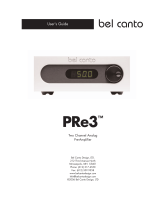Page is loading ...

Pre1
Balanced Control Preamplifier
User's Guide and
Operating Information
Bel Canto Design • 212 Third Avenue North–Suite 345 • Minneapolis, MN
55401
Phone: (612) 317.4550 • Fax: (612) 359.9358 • Email:
© Aug, 2000

Pre1
Balanced Control Preamplifier
Contents
Bel Canto Statement 3
Design Features 4
Unpacking Your Preamplifier 5
Front Panel Layout & Controls 6
Rear Panel Layout & Connections 7
Specifications & Warranty 8

Bel Canto grew from the quest to achieve the ultimate musical
satisfaction from an audio system. This quest began with the discovery of the
inherent sonic qualities and musical performance potential of a nearly forgotten
technology, the single-ended triode amplifier. The ability of this type of amplifier
to recreate the musical experience and evoke a powerful emotional response in
the listener, much like the live event, inspired the development of the SET line of
amplifiers through the ultimate expression of this technology.
For the better part of a decade this quest continued and has resulted in
a line of fine audio amplifiers and preamplifier that are designed to provide
unparalleled musical reproduction. Bel Canto Design's goal for the Pre1 is simply
to provide the most expressive and powerful musical experience outside of the live
event and bring some of the greatest musicians and their performances into the
intimacy of your home.
The Pre1 represents the potential of modern technology when
amalgamated with the very newest circuit architectures and parts. We hope you
enjoy this fine instrument for many years to come.
Bel Canto Design

Design Features
The Pre1 output stage uses the latest integrated
technology to combine multiple amplifiers and
Laser trimmed precision resistors in a true
balanced output stage. This balanced stage
mimics the operation of a transformer, providing
ideal line-level audio drive into either a balanced
or single-ended load. This operation eliminates
ground loop issues with power amplifiers when
used with either the RCA outputs or the XLR.
This assures maximum signal to noise and
extremely low distortion with the shortest audio
signal path.
The power supply uses a separate low noise
regulation for each channel’s gain stage. Audio
grade decoupling capacitors, star grounding and
careful signal routing insure that low-level
signals are preserved.
The volume control is a precision Crystal 3310
potentiometer controlled by a microcontroller.
This device provides extremely low noise and
distortion coupled with high accuracy. We have
found the sonic quality to be as good as or
better than the best potentiometers and
switched attenuators with a long useful life and
no wear.
The input processing provides two (2) true
balanced input connections and three (3) RCA
jack connections plus Tape In. The Tape Output
is an RCA output with an active audio-grade
buffer preamplifier to isolate the internal signal
bus from the tape output. The main outputs are a
single-ended RCA and a balanced connection
for use with balanced cables and power
amplifier inputs.
The elegant simplicity of the signal path and gain
stage allows the Pre1 to preserve the audio
signal quality.
Warm Up
The Pre1’s sonic performance will start to
stabilize after approximately forty (40) hours of
continuous power up.

Unpacking
This box should contain the following parts:
1 - Pre1 User's Guide
1 - Power Cable for connection to utility
power [1.85m, 6' long]
1 - Pre1 audio preamplifier
1 - Bel Canto Owner's Warranty &
Registration Card (If purchased outside the
US please contact your dealer/distributor for
warranty information.)
Carefully unpack each piece and check for
shipping damage. If there is any damage, or if
a piece is missing, please contact your dealer or
Bel Canto Design. Save all packing materials
as the packing is specially designed to protect
the preamplifier for shipping or transporting it. If
you lose or damage the packing materials and
carton, please contact your dealer or distributor
before attempting to transport the preamplifier.
POWER Connection
The Pre1's power supply is preset for the
proper national voltages before your
receive it. The power cable should have the
correct plug for your local power system. If
you believe this is not true, please contact
your
dealer immediately.
Warning
Do not connect power to this preamplifier yet!
This preamplifier, like any electrical component, can be dangerous and cause injury unless cor
rect handling procedures are observed and used. Before powering this preamplifier it is
necessary to read and follow proper procedures concerning its setup and use.
Do not open up your Pre1 (do not remove the chassis covers). There are no user serviceable
parts inside. Any tampering of internal parts will immediately void your warranty and could
cause serious injury to you.
Complete and mail the Owner's Registration Card immediately in order to activate your warranty.

Front Panel Controls
1) Volume Up – increases the output gain
in 0.5 dB increments from 0 to 100 with
100 being maximum gain.
2) Volume Down – decreases the output
gain in 0.5 dB decrements.
3) Balance Left – decreases the gain of the
right channel in 0.5db increments to a
maximum of -6 dB.
4) Balance Right – increases the gain of
the right channel in 0.5db increments to a
maximum of +6 dB.
5) Mute – Red Led above the mute button
will illuminate when the preamplifier is in
mute mode. Disconnects audio input, and
hard mutes the audio output.
6) Inputs – One of the red LED’s on the left
side of the display panel will illuminate to
show the selected input. The input button
allows user to select between the source
inputs labeled 1-4 on the back panel of the
preamplifier. Note: #5 is an internal input
and is accessible only when the optional
internal source is installed.
7) Tape – Activates the input labeled tape
on the back panel of the preamplifier.
Note: the tape output connectors,
regardless of the tape button being
selected on the front panel, will always
output the signal of the main input (button
6) you have selected, without going
through the volume control (output will
be full volume.) Selecting the tape
function can be used for a variety of
functions:
7a) When the tape input of a tape deck is
connected to the tape output of the
preamplifier you may record any selected
preamplifier source (CD, LP, Tuner, etc.)
When the tape output of the tape deck is
connected to the tape input of the
preamplifier you may also monitor the
recording you are doing in order to verify
the recording quality.
7b) Output to an external signal processor;
surround sound processor, or equalizer.
Proper setup of this loop may differ
depending on the processor, refer to the
owners manual of your processor for
setup instruction.
7c) Output to a separate audio system. By
connecting the tape out of the preamplifier
to any input on a second audio system you
can listen to any source you have selected
on the preamplifier, on both systems, at
the same time.
8) Loop - Activates the input marked loop
on the back panel of the preamplifier. This
input bypasses the volume control and all
other internal circuits and allows the loop-
input signal to go directly to the
preamplifier output. Uses include: pass-
through for a CD player or other source
with its own volume control and pass-
through connection to external surround
sound processor.
9) Standby – When in standby mode all
front panel lights are turned off, except for
the standby LED. Most of the internal
circuitry is active while muting output.

Rear Panel Connections
The rear panel provides 5 total source
inputs and 3 total source outputs,
including RCA and XLR type connections.
Beginning from the left side of the rear
panel the connections are as follows:
• XLR Output Jacks for Left and
Right Channels
These outputs go to your power amplifier or
active crossover if it has XLR inputs. They
use the standard Male XLR pinout pattern of:
1 - Gnd
2 - Plus Signal
3 - Minus Signal
• RCA Output Jacks for Left and
Right Channels
These RCA outputs can be used instead of,
or in addition to, the main XLR outputs to your
power amplifier, active crossover, or
sub-woofer.
• Loop Input for Left and Right
Channels
Passes the input signal directly through to the
main outputs and bypasses all internal
circuitry. Used for sources with internal
volume controls. This input bypasses the
preamplifier for use with a surround sound
processor.
• Tape Output
Buffers the signal from the source selected
at the front of the preamplifier to drive the
input of a separate piece of audio equipment.
See explanation under the Tape heading on
the Front Panel Connections page.
• Tape Input
May be used as an input from any source
including the source hooked up to the tape
output, see explanation under the Tape
heading on the Front Panel Connections
page. To use this input you must push
the button labeled Tape on the front
panel of the preamplifier.
• Balanced XLR Inputs #4 & #3
These inputs come from a balanced signal
sources (CD, LP, Digital Converter, etc.) A
non-balanced source can be connected to
these inputs using a specially constructed
cable with an RCA plug on one end and an
XLR Male connector on the other end, or RCA
to XLR adapters can be used. Contact your
retailer, cable supplier or Bel Canto Design
for details on this. These female XLR inputs
use the standard pinout pattern of:
1 - Gnd
2 - Plus Signal
3 - Minus Signal
• RCA Inputs #2 & #1
These inputs can be used only with sources
with RCA type outputs and RCA type
interconnect cables (CD, LP, TV, VCR, etc.)
• System placement of the Pre1
The Pre1 may be situated within your system in
any convenient manner desired. For easy
access to the control buttons the most typical
arrangement places the Pre1 on the top of a
rack or shelf unit.
We do not recommend placing weights or other
objects directly on the Pre1. This may mar or
scratch the chassis finish.

Specifications
Volume setting for unity gain • 84
Input overload • 5 Volts rms
Bandwidth Into >600 Ohms • 0 Hz-200 kHz
Signal to Noise Ratio re 1 volt out • >100 dB A weighted, 20-20KHz
Distortion at 1 Volts rms Out • <0.01%
Input configuration and impedance • Single-ended/balanced 20K ohm
Output Options • 2-XLR Balanced; 2-RCA; 1-buffered RCA Tape Out
Output Impedance • 50 ohms
Maximum Output Level • 10 volts rms Balanced
Gain Single-ended • 16 dB
Gain Balanced • 16 dB
Power Requirements • 100-120 VAC 50-60 Hz or 230-240 VAC 50-60 Hz 25VA
Size • 17.5”W x 15”D x 4”H (mm x mm x mm) Weight • 14lbs. (6.5kg)
Warranty Information
Please take a moment to fill out your warranty registration card.
Returning this registration validates your warranty and allows us to send you
information on product updates and new product development. Completion of
this card is requested within 15 days of purchase to ensure immediate warranty
coverage.
Bel Canto Design offers a 5-year limited warranty on internal parts and
workmanship and will replace any defective parts directly. This warranty is void
if damage is due to abuse, neglect or unauthorized modification.
Bel Canto Design products are uniquely identified with a serial number
on the back panel or the bottom plate of each unit. This number is required to
validate your warranty along with a copy of the original purchase receipt, please
reference it if service is required. If you have any questions, comments or if we
can be of service, please contact us Monday through Friday 9:00 a.m. - 5:00
p.m. central time.
/








